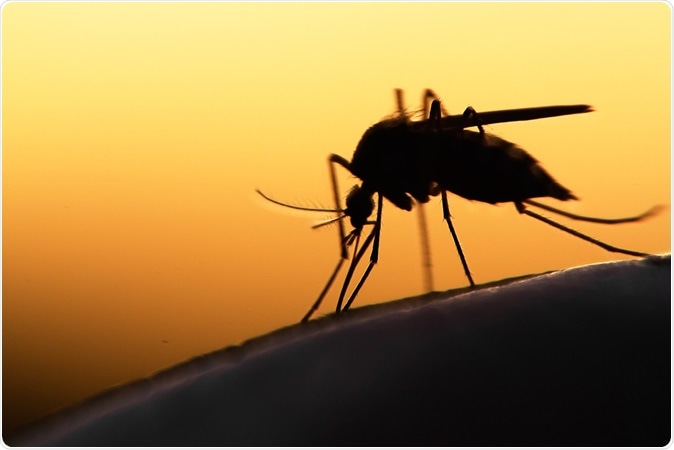The spread of a single multidrug resistant malaria parasite strain in Vietnam is cause for alarm say researchers. Writing in a letter in the latest issue of The Lancet Infectious Diseases, Mallika Imwong, Department of Molecular Tropical Medicine and Genetics, Faculty of Tropical Medicine, Mahidol University Bankok, Thailand, and colleagues say that there is a rise of resistance to Artemisinin among the Plasmodium falciparum or malaria parasites in the Greater Mekong subregion.

Mosquito. Image Credit: mycteria / Shutterstock
The researchers explain that this rise of resistance to artemisinin compounds means that these are resistant to several other antimalarial drugs that are at hand. This could be one of the “greatest threats to the control and elimination of malaria” they write. This new found resistance to artemisinin they explain is due to genetic mutations in the PfKelch gene. They said that initially they noted several mutations or genetic alterations at the Kelch gene. However very recently a “sinister” development took place that lead to the rise of a mutant lineage of the malaria parasite called the P falciparumC580Y mutant in western Cambodia. This outgrew the other mutant strains and also developed a resistance to another anitmalarial drug called piperaquine. This mutant parasite line was first found in Pailin in western Cambodia and was termed PfPailin.
Cambodia was using dihydroartemisinin-piperaquine as first-line antimalarial treatment. Now with the emerging resistant strains has changed to artesunate-mefloquine. PfPailin from western Cambodia has since then spread to northeastern Thailand and southern Lao. Now these mutant strains have spread to south of Vietnam. There too there are reported cases of failure of the malaria cases to respond to treatment with dihydroartemisinin-piperaquine that is the National standard treatment as first line for malaria. This spread is a worry that could be concern the world said the researchers.
Prof Arjen Dondorp, the head of the unit called it a “serious threat” and said that it is something to alarmed about that the strain is spreading so rapidly. He added that this strain could not cross borders and eventually “jump to Africa”. He said that in Vietnam one in three cases were failing to respond to the national first line treatment. In some areas of Cambodia the failire rate was close to two in three he added.
Malaria
Malaria affects 212 million people yearly worldwide. It is manifested by fever along with chills and rigors. Unless it is diagnosed and treated promptly, it can be fatal. It is spread by mosquitoes that feed upon the infected blood and spread it to others.
It is caused by malaria parasite called Plasmodium. This is a microscopic parasite that is transmitted by certain species of mosquitoes. The Plasmodium parasite is mainly spread by female Anopheles mosquitoes, which are night-biting mosquitoes. Although there are numerous types of Plasmodia parasites, only four cause malaria in humans. These include Plasmodium falciparum, Plasmodium vivax, Plasmodium ovale and Plasmodium malariae.
Malaria is diagnosed by looking at blood samples and antigen tests. The parasites are visible under the microscope. Once the diagnosis is made, treatment should be begun promptly. Almost all individuals make complete recovery. Anti-malarial medication is used both to treat and prevent malaria. Malaria can sometimes become complicated leading to life-threatening consequences such as severe anemia, cerebral malaria, rupture of sleep, kidney damage and multi-organ failure.
References: https://www.tropmedres.ac/ and http://www.thelancet.com/journals/laninf/article/PIIS1473-3099%2817%2930524-8/fulltext